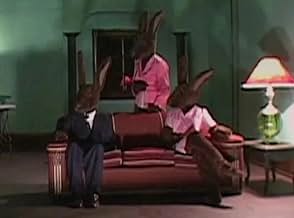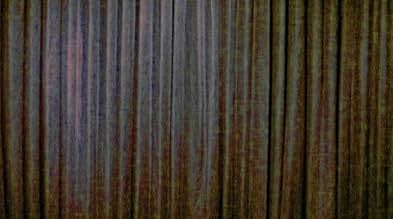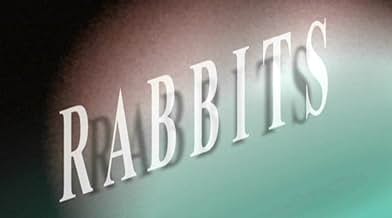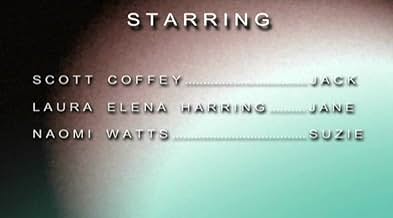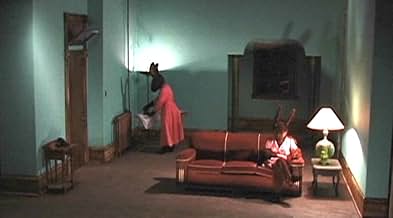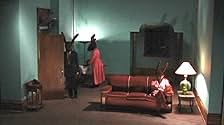Rabbits
- 2002
- 43m
ÉVALUATION IMDb
6,9/10
8,9 k
MA NOTE
Dans une ville sans nom inondée par une pluie continue, trois lapins vivent avec un mystère effrayant.Dans une ville sans nom inondée par une pluie continue, trois lapins vivent avec un mystère effrayant.Dans une ville sans nom inondée par une pluie continue, trois lapins vivent avec un mystère effrayant.
Avis en vedette
Here, we get a David Lynch-ized sitcom set and our three characters, dressed in Rabbit suits. The "mystery" is knawing at these characters although what they say is often incomprehensable. On top of this, the piece is supported with a laugh track. I know what you're thinking. It's an absurdist film, right? No.
I don't know how they did it with these elements that would seem laughable from afar, but you know what? You turn off the lights in your room and you watch all eight parts to this, and you'll have nightmares for a week. David Lynch can make anything terrifying. A complete surprise in mood. You won't forget it.
I don't know how they did it with these elements that would seem laughable from afar, but you know what? You turn off the lights in your room and you watch all eight parts to this, and you'll have nightmares for a week. David Lynch can make anything terrifying. A complete surprise in mood. You won't forget it.
There's a technical term with which you must be familiar in order to begin to appreciate what David Lynch has created with this remarkable web series. That term is Diegesis which essentially means that the voices or sounds are in fact part of the world and moment which we are witnessing on screen. In the case of Rabbits it's a very intentionally open question as to just when and where and from whom is originating the spoken dialog, reinforced by the fact that we aren't able to see anyone's mouth. Perhaps the actors prerecorded their lines which are being played back as a soundtrack as they pantomime their roles? Or maybe the voices were overdubbed after the drama was videotaped? Do the words we are hearing even have anything at all to do with what we are watching? Are the words intentionally misleading so as to throw us off the trail of the real story? Is the dialog intentionally fractured & scrambled so as to disrupt any possible linear, literal comprehension? Was the dialog lifted from another source altogether?!
More questions: Are the characters, in fact, aware of each other? Maybe they are figments of each other's imagination? Maybe they are reminiscing about their pasts, recalling individual episodes of personal experiences which hold meaning only to themselves? Do these characters live together, or maybe they each individually lived in the grim apartment consecutively? Is the male rabbit a visitor? Why does the unseen, possibly imaginary audience applaud excessively when he enters the room and stands oddly at the door, almost as though uncomfortable with the warm reception? Why does the mysterious audience laugh at seemingly random moments, which I at first believed occurred only in response to any mention of time or time related concepts, but this theory soon proved unsustainable? Are the rabbits related? Is one of the female rabbits the mother and the other the wife? And just who or what the hell is that bizarre mouth like orifice that occasionally appears and drones incomprehensibly while one rabbit conducts what might be a ceremonial ritual with flashlights? And what of the intermittently igniting match that burns into the upper right corner of the screen as though signaling a moment of particular import, and which sort of resembles those odd circular dots in older films that alerted the projectionist to an imminent reel change?
Rabbits is anything but definite; it's so thoroughly, utterly indeterminate, uncommitted, tenebrous. Is it a simple Post Modern theatrical production being staged on successive nights - nine brief episodes totaling 50 minutes? Or is it a piece of Off Broadway Absurdist Theater intended as an homage to a time when commercial theater tolerated more daring, more experimental forms of drama? Is it an Off Off Broadway production still in rehearsals? Is it a security cam recording of a bit of extra curricular thespian activities? Or maybe it's even some bizarre theatrical cult that nightly conducts pagan rituals to appease the fickle and malevolent Drama Gods? Is it taking place in a theater, or on a Hollywood sound stage, or on the set of a show that David was perhaps hoping to convince some unusually brave or foolish TV executive to televise? Is it just a video record of shenanigans with some of Lynch's friends, made for their own amusement? Are they aware of what they are involved in? The possibilities are limitless as well as the questions, and that seems to be the point. Well, not the point, but the method; the method of Lynch's inspired, outrageous, ridiculous, sublime madness.
What it seems to be is a purposely abstract, incoherent, ineffable expression of pure creativity. It defies all possible labels, genres and names, and seems to relish the precarious position it occupies in my baffled, bewildered, frantically deducing mind. It exudes such a sinister, almost macabre atmosphere, and yet it dares you to assume that there's anything suspicious occurring. Theater of the Absurd came into fashion in the late 50s, but the decor on stage is late 20s or early 30s Art Deco, so it may be that the furnishings have occupied this "room" for decades. Film Noir - Lynch's preferred form of cinematic expression - also came into fashion in the 50s, and the genre thrived in the same moody ominous atmosphere that this video piece exudes, thanks to Angelo Badalamenti's signature musical score which is particularly muted and subdued. The doleful, mournful wail of a distant train whistle is nearly comical and yet so poignantly evocative, as is the omnipresent gentle storm which drenches the proceedings in a corny, maudlin, overstated gloom. The stage set might bring to mind the bleak, stark TV set apartment that Jackie Gleason's Honeymooners occupied, which only adds yet another preposterously comical layer of meaning to the mix. And yet it all adds up to something indescribably eerie and treacherous.
These furry, large eared characters might be indiscriminate, random creatures functioning as placeholders, as stand ins for real actors who may one day actually perform the piece. It seems to be suggesting that characters in drama are better seen as unreal, non human entities more appropriate and consistent with the artifice and unreality of the theatrical form. Lynch may be implying that a dramatic persona is best understood as a manifestation of a more fanciful non reality, a product of imagination & fantasy, and isn't that, after all, the essence of childhood play? But then why is it all so damn taunting and threatening?! The cumulative effect - as all the dark, dreary, heavy atmosphere might dictate - however, is not at all depressing. No, on the contrary, it's very compelling and disturbing and thrilling and wonderful. And that might be the most confounding part, just how profoundly pleasant an experience is David Lynch's Rabbits.
More questions: Are the characters, in fact, aware of each other? Maybe they are figments of each other's imagination? Maybe they are reminiscing about their pasts, recalling individual episodes of personal experiences which hold meaning only to themselves? Do these characters live together, or maybe they each individually lived in the grim apartment consecutively? Is the male rabbit a visitor? Why does the unseen, possibly imaginary audience applaud excessively when he enters the room and stands oddly at the door, almost as though uncomfortable with the warm reception? Why does the mysterious audience laugh at seemingly random moments, which I at first believed occurred only in response to any mention of time or time related concepts, but this theory soon proved unsustainable? Are the rabbits related? Is one of the female rabbits the mother and the other the wife? And just who or what the hell is that bizarre mouth like orifice that occasionally appears and drones incomprehensibly while one rabbit conducts what might be a ceremonial ritual with flashlights? And what of the intermittently igniting match that burns into the upper right corner of the screen as though signaling a moment of particular import, and which sort of resembles those odd circular dots in older films that alerted the projectionist to an imminent reel change?
Rabbits is anything but definite; it's so thoroughly, utterly indeterminate, uncommitted, tenebrous. Is it a simple Post Modern theatrical production being staged on successive nights - nine brief episodes totaling 50 minutes? Or is it a piece of Off Broadway Absurdist Theater intended as an homage to a time when commercial theater tolerated more daring, more experimental forms of drama? Is it an Off Off Broadway production still in rehearsals? Is it a security cam recording of a bit of extra curricular thespian activities? Or maybe it's even some bizarre theatrical cult that nightly conducts pagan rituals to appease the fickle and malevolent Drama Gods? Is it taking place in a theater, or on a Hollywood sound stage, or on the set of a show that David was perhaps hoping to convince some unusually brave or foolish TV executive to televise? Is it just a video record of shenanigans with some of Lynch's friends, made for their own amusement? Are they aware of what they are involved in? The possibilities are limitless as well as the questions, and that seems to be the point. Well, not the point, but the method; the method of Lynch's inspired, outrageous, ridiculous, sublime madness.
What it seems to be is a purposely abstract, incoherent, ineffable expression of pure creativity. It defies all possible labels, genres and names, and seems to relish the precarious position it occupies in my baffled, bewildered, frantically deducing mind. It exudes such a sinister, almost macabre atmosphere, and yet it dares you to assume that there's anything suspicious occurring. Theater of the Absurd came into fashion in the late 50s, but the decor on stage is late 20s or early 30s Art Deco, so it may be that the furnishings have occupied this "room" for decades. Film Noir - Lynch's preferred form of cinematic expression - also came into fashion in the 50s, and the genre thrived in the same moody ominous atmosphere that this video piece exudes, thanks to Angelo Badalamenti's signature musical score which is particularly muted and subdued. The doleful, mournful wail of a distant train whistle is nearly comical and yet so poignantly evocative, as is the omnipresent gentle storm which drenches the proceedings in a corny, maudlin, overstated gloom. The stage set might bring to mind the bleak, stark TV set apartment that Jackie Gleason's Honeymooners occupied, which only adds yet another preposterously comical layer of meaning to the mix. And yet it all adds up to something indescribably eerie and treacherous.
These furry, large eared characters might be indiscriminate, random creatures functioning as placeholders, as stand ins for real actors who may one day actually perform the piece. It seems to be suggesting that characters in drama are better seen as unreal, non human entities more appropriate and consistent with the artifice and unreality of the theatrical form. Lynch may be implying that a dramatic persona is best understood as a manifestation of a more fanciful non reality, a product of imagination & fantasy, and isn't that, after all, the essence of childhood play? But then why is it all so damn taunting and threatening?! The cumulative effect - as all the dark, dreary, heavy atmosphere might dictate - however, is not at all depressing. No, on the contrary, it's very compelling and disturbing and thrilling and wonderful. And that might be the most confounding part, just how profoundly pleasant an experience is David Lynch's Rabbits.
The single camera is fixed on a wide shot of a sparsely-furnished, eerily-lit apartment, a subdued den of deco and menace. Yes, a glance confirms, Mr. Lynch is caretaker here.
For five minutes, as Badalamenti's synths sigh over distant fog horns and muted thunder, we watch the rabbit people--actors in cheap rabbit suits worn under drab human clothing. Their day is winding down. They work at an ironing board, sit on the art deco sofa, rise, sit down again, exit, return, sing some verses about "dark, smiling teeth," and trade dark, smiling dialogue. The rabbit people play to an unseen studio audience, which greets their entrances with on-cue applause and their oblique lines with canned laughter. Minutes pass. . . Then: a superimposed mouth begins a demonic incantation. A huge match burns. The camera blurs out of focus, and then--you'd better believe it!--refocuses.
That's it. The result is weird, beautiful, unnerving, and, frankly, never far from being boring.
For five minutes, as Badalamenti's synths sigh over distant fog horns and muted thunder, we watch the rabbit people--actors in cheap rabbit suits worn under drab human clothing. Their day is winding down. They work at an ironing board, sit on the art deco sofa, rise, sit down again, exit, return, sing some verses about "dark, smiling teeth," and trade dark, smiling dialogue. The rabbit people play to an unseen studio audience, which greets their entrances with on-cue applause and their oblique lines with canned laughter. Minutes pass. . . Then: a superimposed mouth begins a demonic incantation. A huge match burns. The camera blurs out of focus, and then--you'd better believe it!--refocuses.
That's it. The result is weird, beautiful, unnerving, and, frankly, never far from being boring.
Lynch really elevated my opinion of him here. This is very, very well constructed. It is the highest art.
That means that any "explanation" will be worthless. You can read some other material to discover something of what you will see.
Its unsettling and strange, hypnotic and lyrical. That it is in several "episodes" is all a part of how certain familiar forms are subverted to give us something that has identity and also has a sort of meta-identity defined by deviance from the expected.
My observation will be highly personal. I see this as a sort of "Rosencrantz and Guildenstern" but instead of referencing "Hamlet" engages "Alice in Wonderland." It fits, especially if you are inclined as I am to blow Alice into something as world-swallowing as Hamlet. Where Hamlet is all about what it means to sit in the world, Alice works at more refined level, being all about what it means to carry a name in the world.
One is about being and the other about what we see and acknowledge about being. Its this second conceptual space that Lynch inhabits, always has. His "firewalking" TeeVee stuff bends notions of representation and discovery, the amusement being not in what we see, but in the difference between what we expect to see.
Let's look at the entire vocabulary he has toyed with. First, he acknowledges the audience (laugh track), camera (static but in and out of focus), narrative (drawn more overtly by its fragmentation), framing (with very formal, abstract composition) and "acting," which here consists more of pauses and empty spaces than anything we normally associate with acting.
And then there's the bending of the form. We have a demon that appears twice. Its noir drawn tightly, especially since there is a hint that the demon or his avatar as perhaps a "lost dog" is driving the entire situation.
And then we have three "performances," one each by the three characters. These are accompanied by an ignited set, literally ignited. The performances, which each occupy an episode, are pretty transcendent in terms of what we would see in an ordinary drama. In such a case, each would "solo" in such a way that their soul was revealed. Its the challenge of the writer to weave this into events in such a way that we don't see the performer revealing his character overtly. This is different; all pretense is removed. The character enters and opens its heart with no narrative baggage. What the character tells us actually has more information about context than the surrounding context provides.
Ted's Evaluation -- 3 of 3: Worth watching.
That means that any "explanation" will be worthless. You can read some other material to discover something of what you will see.
Its unsettling and strange, hypnotic and lyrical. That it is in several "episodes" is all a part of how certain familiar forms are subverted to give us something that has identity and also has a sort of meta-identity defined by deviance from the expected.
My observation will be highly personal. I see this as a sort of "Rosencrantz and Guildenstern" but instead of referencing "Hamlet" engages "Alice in Wonderland." It fits, especially if you are inclined as I am to blow Alice into something as world-swallowing as Hamlet. Where Hamlet is all about what it means to sit in the world, Alice works at more refined level, being all about what it means to carry a name in the world.
One is about being and the other about what we see and acknowledge about being. Its this second conceptual space that Lynch inhabits, always has. His "firewalking" TeeVee stuff bends notions of representation and discovery, the amusement being not in what we see, but in the difference between what we expect to see.
Let's look at the entire vocabulary he has toyed with. First, he acknowledges the audience (laugh track), camera (static but in and out of focus), narrative (drawn more overtly by its fragmentation), framing (with very formal, abstract composition) and "acting," which here consists more of pauses and empty spaces than anything we normally associate with acting.
And then there's the bending of the form. We have a demon that appears twice. Its noir drawn tightly, especially since there is a hint that the demon or his avatar as perhaps a "lost dog" is driving the entire situation.
And then we have three "performances," one each by the three characters. These are accompanied by an ignited set, literally ignited. The performances, which each occupy an episode, are pretty transcendent in terms of what we would see in an ordinary drama. In such a case, each would "solo" in such a way that their soul was revealed. Its the challenge of the writer to weave this into events in such a way that we don't see the performer revealing his character overtly. This is different; all pretense is removed. The character enters and opens its heart with no narrative baggage. What the character tells us actually has more information about context than the surrounding context provides.
Ted's Evaluation -- 3 of 3: Worth watching.
A slow, stylish, eerie and extremely interesting story set "in a city deluged by constant rain where three rabbits live with a constant mystery". Mr Lynch has a great talent for establishing atmosphere and this series is soaked with his trademark (weird) mood. When I watched the first episode I was not sure whether to laugh or be baffled at what I was seeing. 3 Rabbits talk out of sequence, an unseen audience claps whenever one of them enters the room and laughs (not because something funny is said, but at the misery of the rabbits), a candle burns in the corner, a demon face chants something undecipherable (reminds me of the litanies of Satan, the camera seems to be disturbed in the beginning of the 7 out of 8 episodes by something I can only guess to be a spirit. We hear footsteps, the door sometimes opens and the phone even rings. All to the frustration of the rabbits. I noticed a lot of people have tried to figure out what Rabbits is about and my take on it is pretty simple. Firstly, this wasn't the first time I have seen something like this, though this is definitely very well made. I read a book a very long time ago whose title I cannot remember about 2 kids who were put in a scenario similar to this rabbit house and were observed everyday by their captures. The 2 children (I only remember one child called Mavis) were unaware they were being watched and as far as they knew, they had a normal life (went out, watched TV etc) except they didn't in real life. Everything was in their mind. This seems similar to this story. The rabbits could be 'prisoners' who are being observed or kept by someone (the man in the green suit). There is however how they react to the audience (whenever they enter the room and the audience claps, they wait until the applause is finished and continue to sit down) so they are aware they are being watched. According to their dialogue, it seems to me they were once human, "Jane- were you blond?" but it does seem like they remember or who they were. They refer to each other by human names, but they seem confused or disturbed by their situation, "I wish they'd go away", probably referring to the unseen audience. The last episode offers a good climax but not a conclusion. Or is it? Are the rabbits unable to figure out a way out of their misery...or is this their reality as it always has been? Like the book I read, the children never did escape their house, but they did figure out they were not living a 'normal' life. Lynch has never been one to offer a comfortable conclusion to his work- so I would not be surprised if this is the end for his rabbits.
Le saviez-vous
- AnecdotesDescribed by Lynch as a 9 episode sitcom.
- ConnexionsFeatured in Inland Empire (2006)
Meilleurs choix
Connectez-vous pour évaluer et surveiller les recommandations personnalisées
- Was this a TV series?
Détails
- Durée43 minutes
- Couleur
- Rapport de forme
- 1.78 : 1
Contribuer à cette page
Suggérer une modification ou ajouter du contenu manquant


